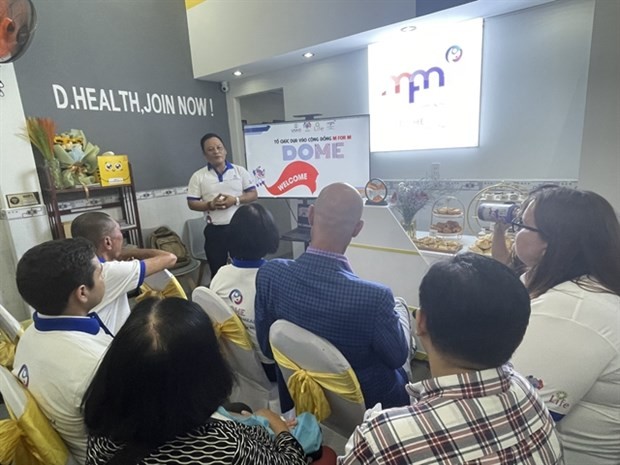 M For M shop located in HCMC’s Tan Phu District, one of the first six shops with health services for HIV prevention and treatment, is being piloted under the community one-stop-shop model called DOME officially launched on September 8. (Photo courtesy of LIFE)
M For M shop located in HCMC’s Tan Phu District, one of the first six shops with health services for HIV prevention and treatment, is being piloted under the community one-stop-shop model called DOME officially launched on September 8. (Photo courtesy of LIFE)
The model is an initiative of the Centre for Promotion of Quality of Life (LIFE) and community-based organizations (CBOs), with its motto of putting customers at the center and a mission of improving the quality of community health.
Its first six shops are located in densely populated areas to create more convenience for customers to easily access health services they need.
Six pillars of the model include outreach, counselling, screening, testing, referral and support.
Through a cooperation network with public health centers and leading health experts, DOME offers health counselling and services such as sexual and reproductive health, HIV and other sexually transmitted diseases, mental health and support for drug addicts to have treatment, among others.
It features three communications channels - online, offline and mobile - to serve customers anytime and anywhere.
Nguyen Thi Lan from LIFE said DOME was an upgraded and more advanced model of the existing CBOs.
“With diversified and essential services, DOME not only serves vulnerable and high-risk groups, including men who have sex with men (MSM), transgender women, drug users and prostitutes, but also others in the community,” she said.
LIFE is committed to accompanying and supporting DOMEs to improve the quality of human resources, develop business plans, and build their brands.
According to the Vietnam Administration for HIV/AIDS Control (VAAC), the strong participation of CBOs in offering HIV tests for early detection has helped reduce the burden on public health stations.
There is an increasing number of people using pre-exposure prophylaxis (PrEP) and post-exposure prophylaxis (PEP) medicines thanks to CBOs.
With diversified types and forms of services, DOME is expected to contribute to the national HIV/AIDS prevention program in a more sustainable way.
The model will help increase access to target groups, increase the number of people at high risk of HIV infection receiving tests, and promptly provide anti-retroviral (ARV) treatment for HIV-positive people.
Supported by LIFE, more than 40 CBOs provide counselling and tests for nearly 40,000 people at risk of HIV, and support 10,000 people accessing the PrEP program each year.
Of that figure, there were about 4,000 HIV-positive cases detected, and about 98 percent of them received treatment.
LIFE's HIV/AIDS prevention and treatment program is funded by the US President's Emergency Plan for AIDS Relief (PEPFAR) through the United State Agency for International Development (USAID), and the Global Fund to fight AIDS, tuberculosis, and malaria through the Union of Science and Technology Associations (VUSTA).
Its first six shops are located in densely populated areas to create more convenience for customers to easily access health services they need.
Six pillars of the model include outreach, counselling, screening, testing, referral and support.
Through a cooperation network with public health centers and leading health experts, DOME offers health counselling and services such as sexual and reproductive health, HIV and other sexually transmitted diseases, mental health and support for drug addicts to have treatment, among others.
It features three communications channels - online, offline and mobile - to serve customers anytime and anywhere.
Nguyen Thi Lan from LIFE said DOME was an upgraded and more advanced model of the existing CBOs.
“With diversified and essential services, DOME not only serves vulnerable and high-risk groups, including men who have sex with men (MSM), transgender women, drug users and prostitutes, but also others in the community,” she said.
LIFE is committed to accompanying and supporting DOMEs to improve the quality of human resources, develop business plans, and build their brands.
According to the Vietnam Administration for HIV/AIDS Control (VAAC), the strong participation of CBOs in offering HIV tests for early detection has helped reduce the burden on public health stations.
There is an increasing number of people using pre-exposure prophylaxis (PrEP) and post-exposure prophylaxis (PEP) medicines thanks to CBOs.
With diversified types and forms of services, DOME is expected to contribute to the national HIV/AIDS prevention program in a more sustainable way.
The model will help increase access to target groups, increase the number of people at high risk of HIV infection receiving tests, and promptly provide anti-retroviral (ARV) treatment for HIV-positive people.
Supported by LIFE, more than 40 CBOs provide counselling and tests for nearly 40,000 people at risk of HIV, and support 10,000 people accessing the PrEP program each year.
Of that figure, there were about 4,000 HIV-positive cases detected, and about 98 percent of them received treatment.
LIFE's HIV/AIDS prevention and treatment program is funded by the US President's Emergency Plan for AIDS Relief (PEPFAR) through the United State Agency for International Development (USAID), and the Global Fund to fight AIDS, tuberculosis, and malaria through the Union of Science and Technology Associations (VUSTA).
























